
The UK’s Liberal Democrats were the first to wake up to the likely devastation the attacks would cause to this segment of the community after the election. Perhaps surprisingly, Labor followed.
Boris Johnson, enmeshed in Brexit, never saw it coming and is on the back foot and the Conservatives are starting to emerge as the anti-small business party.
I have no idea whether this late emerging issue will show opinion pollsters to be once again wrong in an election, but the issues in the UK have great relevance to Australia because both the Australian and British tax offices have the same culture, methods and belief system. The community has moved in a different direction.
In the UK in recent years there have been few constraints put on the brutal methods used by their tax collectors against contactors and small enterprises, whereas in Australia we had a decade or so under Michael Carmody, who could at least keep the Australian Taxation Office culture in check. More recently the judiciary, whistleblowers, the small business ombudsman, the Inspector General of Taxation, the media (including Adele Ferguson and myself) have alerted the community.
In addition, a number of courageous government politicians have taken on the ATO, led by former assistant treasurer Stuart Robert and small business minister Michaelia Cash. In the elected 2019 Morrison government the new assistant treasurer Michael Sukkar, like his UK counterparts, succumbed to ATO pressure and introduced legislation to further increase ATO powers to hit small business and boost regulation which, if passed, will nullify the government’s first-class small business policies in other areas.
READ MORE: US shows the way on a fairer tax collection system | Taxman ‘tried to silence critic’ | ATO chief attacks whistleblower coverage
But there is good news for the nation. The ALP understands the issues and if elected in 2022 will follow its UK counterpart to make the small business tax collection system fair. And we need to recognise that internally the ATO has taken steps to improve the fairness of its methods. But it has a lot to live down.
Last week influential crossbencher Rex Patrick became the first politician to undertake detailed research into the actions of the Australian Taxation Office to punish whistleblower Ron Shamir. Shamir informed the Inspector General of Taxation about bad practices in the ATO and was therefore required by the Inspector General to fill out what is known as a section nine form.

While Shamir was doing that he was sacked for not working. The ATO claimed it did not know he had dobbed it in and that he was working on a section nine. Shamir won his case before Fair Work Australia but the ATO appealed and he faced a battery of QCs and top legal people in the appeal case. He had no money to fight this savage legal attack so, naturally, he lost and is financially destroyed. That’s exactly what happens to small enterprises. Leave aside the merits of a case — the system is totally unfair.
Rex Patrick was brilliant in his interrogation of the Tax Commissioner Chris Jordan before a parliamentary committee as he swapped between evidence before Fair Work and Jordan’s parliamentary statements. But in those sorts of interrogations, you need two or three days and the legal minds of QCs like the banking royal commission’s Rowena Orr and Michael Hodge.
These parliamentary committees do not allow the required time and politicians need to learn the Orr-Hodge skills of cross examination.
To be fair to the tax commissioner he was not forced to admit that the ATO sacked Shamir because of his report to the Inspector General. Patrick is already researching his next ATO interrogation and the nation can be grateful.

Twenty years ago, the tax offices of Australia, the US and the UK offices had similar anti-small business agendas. In the US, President Bill Clinton introduced a whole new set rules which required the US tax collectors to operate fairly.
Fair tax collecting with proper appeal rights boosted US business confidence and is one of the reasons for the excellent 2019 US employment statistics, although President Trump would never give credit to President Clinton.
In the UK, Her Majesty’s Revenue and Customs (our ATO) has had few curbs and found a way to double tax contractors and self-employed — great tax collector sport — and when the hard-hit contractors embraced schemes to avoid double taxation the British tax office attacked these schemes. The courts saw the unfairness and usually upheld the schemes, causing the angry UK tax collectors to take further action. Most of the tax attack was concentrated on the health sector including contract nurses and surgeons.
Now Boris Johnson is allowing Her Majesty’s Revenue and Customs to extend its planned new attacks to the whole private sector. The carnage could send the UK into recession irrespective of Brexit. With Brexit dominating the election this issue erupted late in the campaign.
Australian politicians will be watching the UK election with even greater interest.




Suddenly a new issue is sweeping the UK election with great significance to Australia — the British tax office’s plan to intensify its already brutal attacks on small business and contractors.